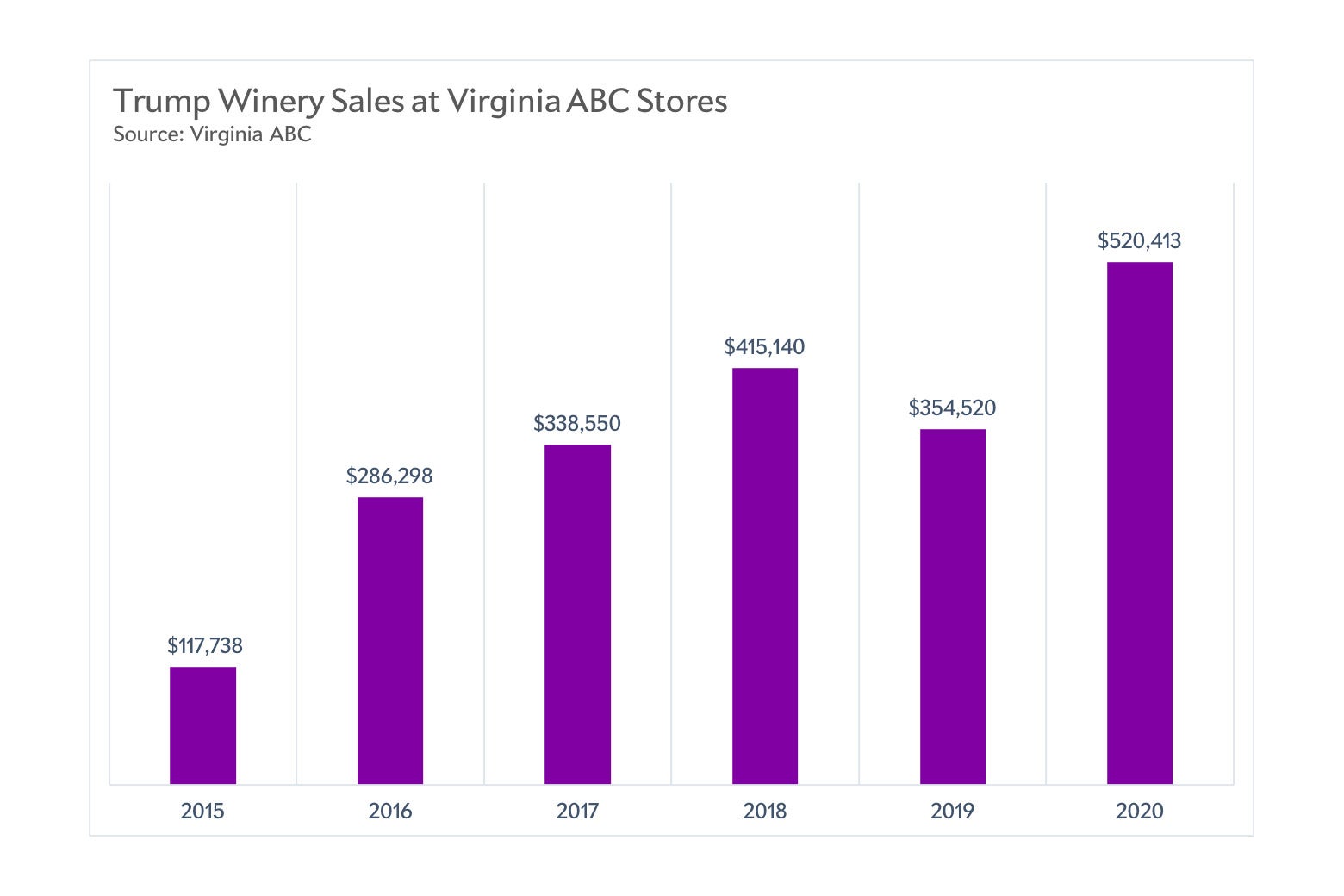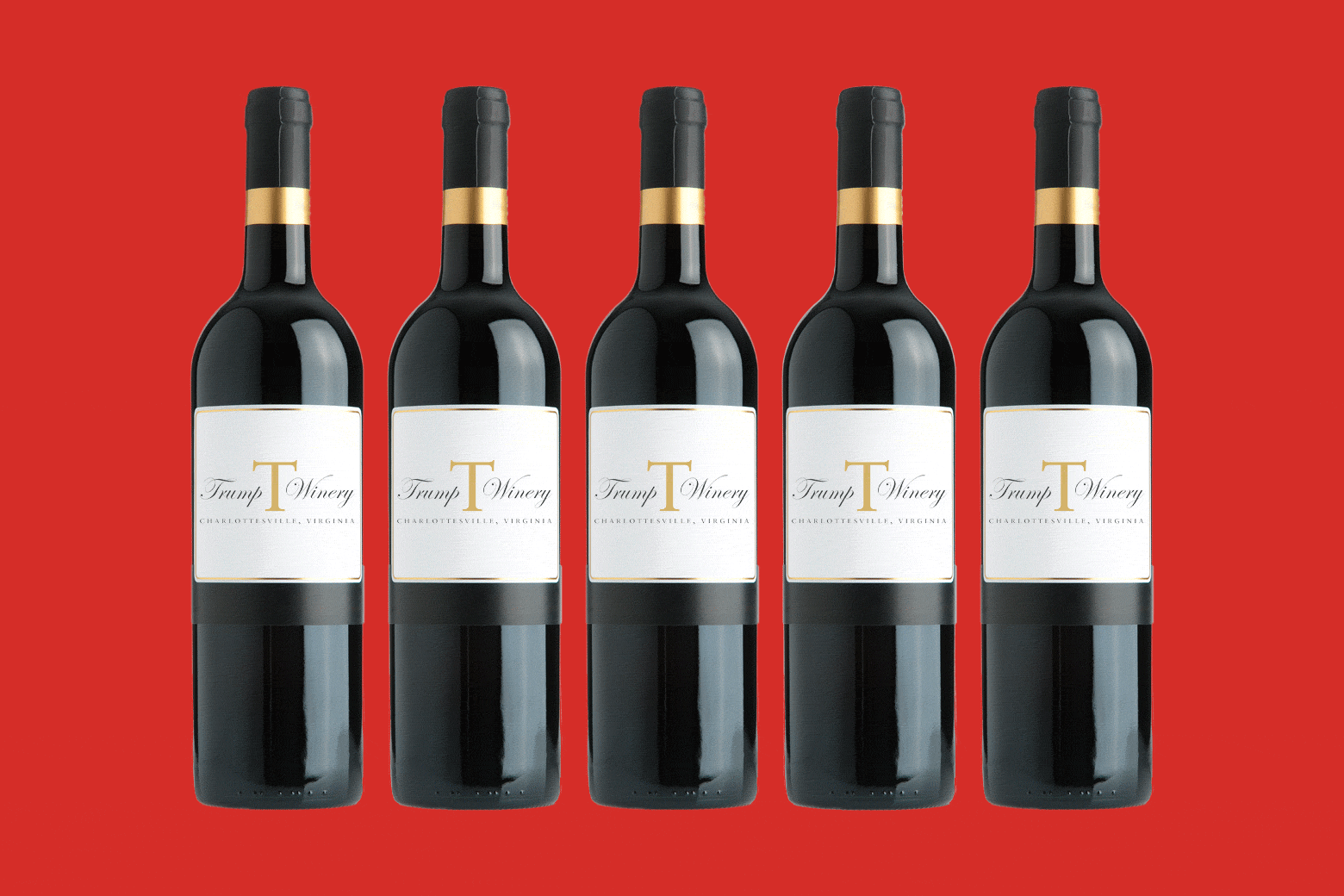This is part of Trump Slump, a series of stories checking in on how things are going now for the people and products that were riding high during the last administration.
Donald Trump’s business empire did not exactly thrive during his presidency. Branding deals collapsed as his name turned toxic in much of the country. The pandemic clobbered his hotels and golf resorts. The Capitol riots of Jan. 6 led longtime partners like Deutsche Bank, his most important lender, and the PGA of America, which moved its championship away from his New Jersey golf club, to finally cut bait.
Yet through all the havoc, it seems that at least one Trump enterprise might not only have benefited from his initial White House run, but continued to flourish through the ups and downs of his Oval Office tenure and into his post-presidential era. That would be the Trump Winery, the apparent success of which is nothing if not a testament to the triumph of politics over taste.
Am I absolutely certain that Trump-brand vino has been flying faster from shelves these past four years? Not exactly. The business doesn’t share sales numbers, and general manager Kerry Woolard hasn’t responded to my requests for an interview. However, there is some compelling evidence that the stuff has enjoyed a sustained popularity boomlet—just enough proof that I’d bet a decent bottle of Bordeaux on it.
You might wonder why the Trump Winery even exists, given that the former president famously doesn’t drink. The answer, as Trump put it himself, is that he was “really interested in good real estate, not so much in wine.” The property sits in the lovely foothills of the Blue Ridge Mountains, just outside of Charlottesville, Virginia, where dozens of vineyards dot the surrounding countryside. (It’s also just a short ride from Thomas Jefferson’s and James Monroe’s old homes, making the drive there feel like a cosmic joke about the strange turns of American history.) The estate originally belonged to Patricia Kluge, a socialite whose ex-husband was briefly America’s richest man, and who began producing some well-regarded wines in the early 2000s—Chelsea Clinton served her sparkling rosé and blanc de blanc at her wedding—before running into financial trouble during the Great Recession.
Trump, an old acquaintance of Kluge’s, bought the winery for cheap in a foreclosure auction in 2011 and put his middle son Eric in charge as president of the business. After a winding legal saga, Trump later snapped up Kluge’s adjacent 26,000-square-foot mansion for a song. Today, it’s a luxury bed and breakfast. There were brief plans to build a PGA-style golf course on the estate’s massive, 217-acre front lawn—which had in fact previously been home to a private course designed by Arnold Palmer—but they seem to have died after neighbors fought back. Mountain Mar-a-Lago was not to be.
(Who exactly owns the winery these days is a tiny bit unclear. A legal notice on its website makes it sound as if the business is now Eric’s pet project, stating that “Trump Winery is a registered trade name of Eric Trump Wine Manufacturing LLC, which is not owned, managed, or affiliated with Donald J. Trump or any of his affiliates.” However, Trump’s presidential financial disclosures suggest he still collects vineyard rent and hotel revenue from the operation.)
Trump has often exaggerated the size of his family’s winemaking operation, claiming incorrectly that it was the largest winery on the East Coast and one of the biggest in the whole country (neither claim is even close to true). But the vineyard is the largest by acreage in Virginia, and its product can be found in stores around the state. During the early, protest-filled days of 2017, the National Organization of Women tried to pressure Wegmans, the cult grocery store beloved by upper-middle-class professionals, to take bottles of Trump Wine off its shelves in Virginia by threatening it with a boycott. The effort appeared to backfire badly, however, as Trump Wine quickly sold out at multiple locations. Though the chain declined to share sales figures with me, you can still pick up an $18.99 750 of Trump’s chardonnay from Wegmans today.
The run at Wegmans may have been the first noticeable sign that Trump fans were snatching up his namesake cab and meritage. Later that year, Woolard, the general manager, told the New York Times that the business’s wine club had grown by 30 percent, to 1,500 subscribers, and that the winery was planning aggressive expansion. It also announced it was planting 20 additional acres of viognier and sauvignon blanc.
The clearest sign that the Trump Winery enjoyed a White House bump, however, comes courtesy of Virginia ABC, the network of state-operated liquor stores, which shared some of its sales data with me. In 2016, Trump Winery jumped from its sixth-top-selling producer to its third, eventually reaching as high as second. In dollars, sales leapt from about $117,000 in 2015 to $415,000 in 2018 to $520,000 in 2020. There seems to have been a slight slowdown in the Biden era, with just $91,000 in sales through the first quarter of 2021, but it remains the store’s No. 3 brand. It is, of course, possible that Virginia ABC is an outlier. But its numbers seem to suggest that wine drinkers are crushing a lot more Trump chard than they used to.

As far as I can tell, business is brisk at the winery itself, as well. Paying a visit on a recent spring weekend, I found the parking lot jammed to near full. The picnic tables, which overlook the genuinely beautiful rolling vineyard, were mostly packed with families and couples working through buckets of rosé. More drinkers were stationed in a semi-enclosed tent. While buying a couple flights of wine to try, I asked the cashier if it was usually that busy; she told me that if anything, she thought foot traffic was a little slow on this particular Saturday. She figured the pandemic had boosted business, because the winery was a nice place to sit outside (and in case you’re wondering, yes, everyone in the shop was wearing masks).
Expert opinion on the actual wine is somewhat divided. Some critics will tell you it’s surprisingly good. In Vanity Fair, on the other hand, it was once described as “Welch’s grape jelly with alcohol.” My own position falls somewhere in between: With a couple exceptions, the stuff is mostly undrinkable but no worse than a lot of other Virginia wine. That may sound like a harsh assessment of a state where American viticulture was born and that has spent decades trying to produce world-class vintages. But even the best examples are often slightly mediocre versions of a wine you could get from elsewhere in the world for $7 to $8 less per bottle, and the worst have left me dazed and muttering in disappointment, sort of like whenever I watch a Florida election result.
You see a similar range on the Trump property. The sparkling wines weren’t bad—the blanc de blanc, especially, had a nice, lemony zip with only a hint of a weird aftertaste; as long as someone was serving it to me for free, I’d happily drink it, but at $34 a bottle, you can find better, cheaper bubbles. Their viognier was drinkable, too. Done right, the grape produces a lovely, underrated wine that often smells like honeysuckle. The Trump version reminded me more of a Haribo peach ring, but not necessarily in a bad way.
From there, however, things turned dark. Like a few others I’ve tried in Virginia recently, the chardonnay had a bizarre, off-putting taste I can only describe as liquid compost. The cabernet sauvignon was so weirdly sour it made me physically recoil. And the meritage had an unbalanced, smoky bitterness, kind of like I was drinking water out of an ashtray. Given the quality of what it bottles, I’d say the Trump Winery really would be better off as a golf course. Except, hey, the stuff sells.
